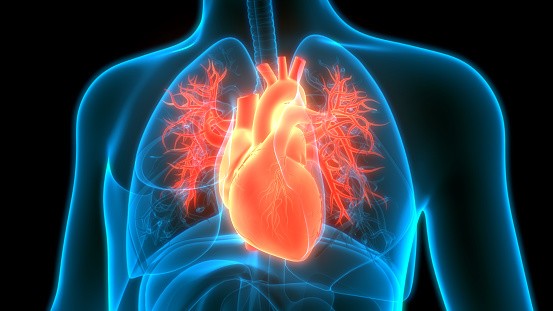
Local 12: Researchers discover AI helps provide better data in the study of the heart
UC expert is researching how wearables can help treat atrial fibrillation
A new study shows that artificial intelligence (AI) could help collect more information through smartwatches, and it could even help reduce a person's odds of a heart-related event. The new study found that people who use wearable devices, such as an Apple Watch, can get much better heart data with the help of AI. Local 12 produced a story on the study, interviewing Richard Becker, MD, of the Division of Cardiovascular Health and Disease at the UC College of Medicine, who is conducting research on how wearables could help treat atrial fibrillation in a more targeted fashion.
Researchers give those involved in that study an Apple Watch. Then the study participants only take medication if the watch alerts researchers that they need it.

Richard Becker, MD, professor in the UC Division of Cardiovascular Health and Disease at the UC College of Medicine/Photo/Colleen Kelley/UC Marketing + Brand
"We could get the best of both worlds," said Becker. "We use a blood thinning medicine to reduce stroke when it’s needed, but not have that risk of bleeding, should a person not have recurring episodes of atrial fibrillation.
Researchers in this study in the journal Nature have figured out what may one day help take a study like this one step further.
When a watch moves on a person’s wrist, it creates noise that can interfere with data collection. This study found AI can help overcome that obstacle.
"They're modeled in such a way that they could take out the noise, meaning there’s a lot of artifact from movement and breathing a variety of things,” Becker said. “What that means is with a wearable device, we might be able to tell a lot about not just a person’s heart rhythm, as we're studying in REACT-AF, but also about the pumping activity of their heart.”
Studying pumping activity, in addition to electrical activity, through wearable devices, could help prevent many more heart events.
"It gives us a reach that we currently don’t have,” said Becker.
Anyone in the country can be enrolled in this heart rhythm study. AI is not a part of it. Researchers will provide the technology and medication needed at no cost.
Read more about UC research on wearable technology and cardiac issues here.
Lead image at top/iStock
Next Lives Here
The University of Cincinnati is classified as a Research 1 institution by the Carnegie Commission and is ranked in the National Science Foundation's Top-35 public research universities. UC's graduate students and faculty investigate problems and innovate solutions with real-world impact. Next Lives Here.
Related Stories
Bono, Chris Tucker Visit UC To Discuss Africa
December 5, 2002
U2's Bono and comedian-actor Chris Tucker led a delegation from the DATA organization who came to UC to talk about potentially catastrophic problems in Africa.
New Year's Help for Those Looking to Kick the Habit
December 20, 2002
Quitting smoking consistently ranks among the top three resolutions made by New Year's resolvers each year.
E-BRIEF: Let's Toast to a Healthier 2003
January 8, 2003
The New Year often means a new health kick: Vows to tone up and trim down, and maybe going to the doctor and getting ourselves as regularly "maintenanced" as we do our cars. So, this week's University of Cincinnati e-briefing examines the health concerns of the young and old, and what you should be doing to preserve your good health.
Today's ML King Events: One On, One Off
January 8, 2003
A memorial march, presentations, poetry and dance will pay tribute to the slain civil rights leader.
UC Named Lead Organization for OSHA Training Consortium
January 13, 2003
UC Continuing Medical Education (CME) has been selected as the lead organization for the Occupational Safety and Health Administration (OSHA) Great Lakes Training Consortium by the U.S. Department of Labor.
Ignorance of Stroke s Warning Signs a Barrier to Treatment; More Education Needed, UC Researchers Report in JAMA
January 13, 2003
Demographic groups facing the greatest risk of death and disability from stroke are the least likely to recognize stroke s warning signs and risk factors, according to a study by UC researchers published in the January 15 issue of the Journal of the American Medical Association (JAMA).
Ignorance of Stroke s Warning Signs a Barrier to Treatment; More Education Needed, UC Researchers Report in JAMA
January 14, 2003
Demographic groups facing the greatest risk of death and disability from stroke are the least likely to recognize stroke s warning signs and risk factors, according to a study by UC researchers published in the January 15 issue of the Journal of the American Medical Association (JAMA).
UC Researchers Find New Link Between the Eye and the Clock in the Brain
January 20, 2003
Results of a study done by a team of researchers working in the laboratories of Michael Lehman, PhD, professor, Department of Cell Biology, Neurobiology, and Anatomy at the UC College of Medicine, will appear in the February issue of Nature Neuroscience.
UC Researchers Find New Link Between the Eye and the Clock in the Brain
January 21, 2003
Results of a study done by a team of researchers working in the laboratories of Michael Lehman, PhD, professor, Department of Cell Biology, Neurobiology, and Anatomy at the UC College of Medicine, will appear in the February issue of Nature Neuroscience.
Leader of Fetal Surgery to Deliver Lectures at UC
January 31, 2003
An internationally recognized authority on fetal surgery will lecture at the UC Medical Center, representing the first of a series of lectures on fetal surgery presented by the department of Obstetrics and Gynecology (Ob/Gyn).
